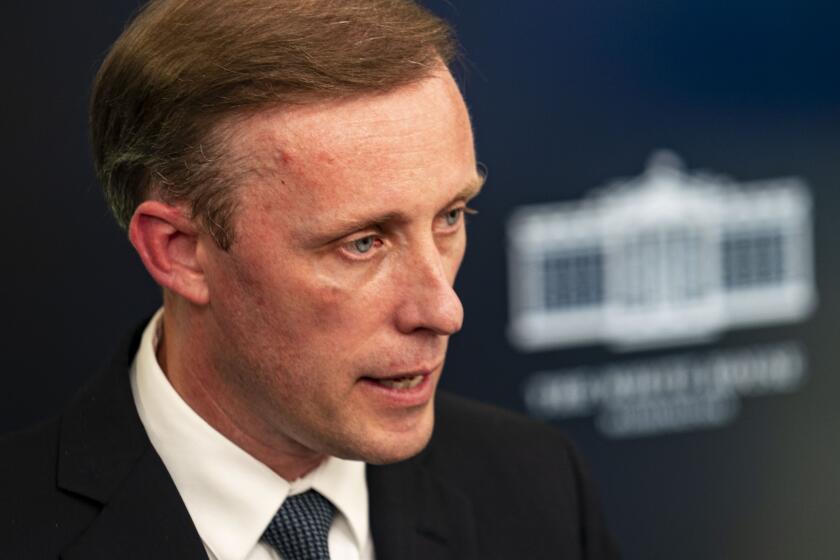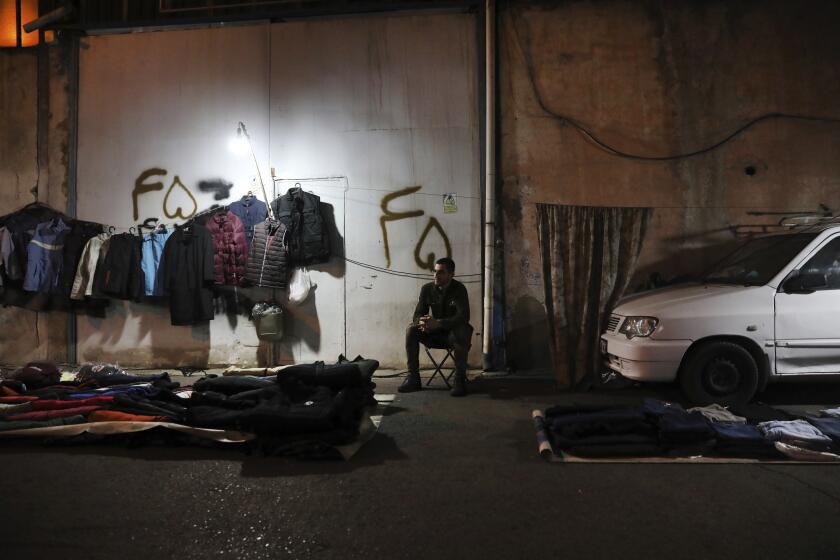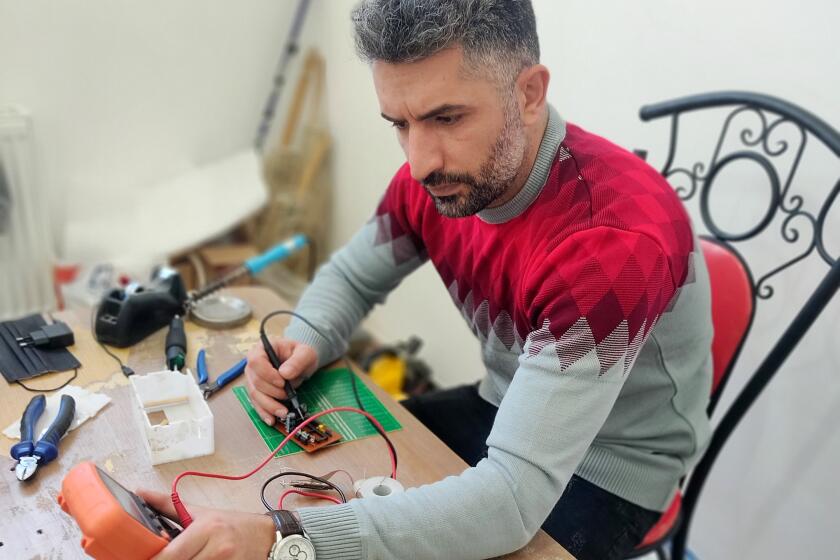Iran is urging people to have babies — and making life hard for those who don’t want to
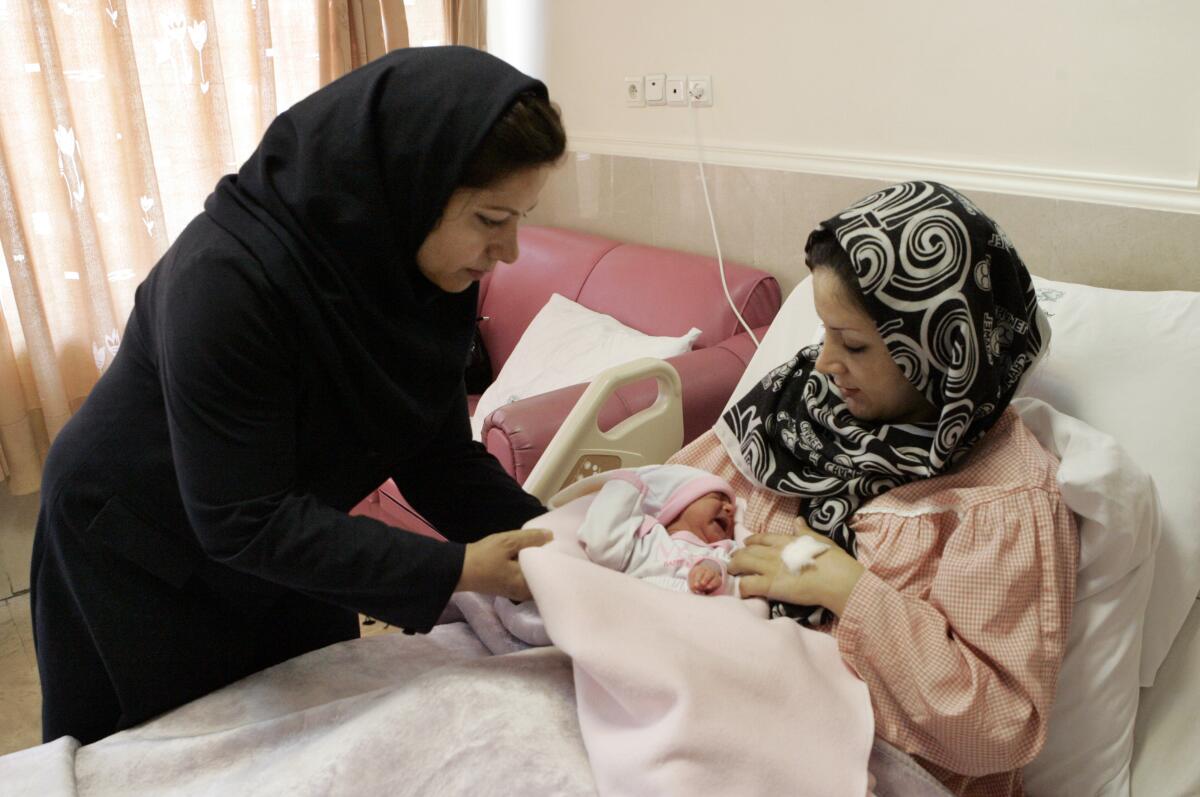
- Share via
TEHRAN — If you’re looking to make a baby in Iran, you won’t find a more willing, supportive and enthusiastic partner than the government.
To encourage you to reproduce, how about a zero-interest loan? Or, if you’re a college professor, a promotion at the office? Maybe you want to buy a domestically made car — just have a child and see your name move up the waiting list.
After years of preaching the virtues of birth control, the Islamic Republic is so eager for its people to procreate that it’s offering a range of financial and other incentives that have stirred up both amusement and outrage. Officials are desperate to reverse a declining birth rate that has fallen below the level necessary merely to hold the current population steady at 84 million.
But the drive to engineer a baby boom also has its dark side, with the state intruding further into people’s private lives and interfering in their most intimate decisions. Just as many Americans are grappling with the conservative-dominated Supreme Court’s reversal of Roe vs. Wade, many Iranians find themselves faced with a hard-line theocratic regime intent on abolishing or severely restricting access to abortion and contraception.
Underground and unregulated clinics are proliferating for women seeking to terminate their pregnancies. Doctors risk revocation of their licenses if they provide such services. Abortifacient and birth-control pills, once cheap and widely available, are being peddled on the black market.
Despite its shrunken coffers, Tehran has allocated $660 million to encourage Iranians to bear children — and discourage those who are trying not to. It has set up a new office in the health ministry dubbed “Youthful Population,” a hopeful-sounding moniker that belies how gravely the country’s leaders view the graying of society and the problems that come with it, such as rising medical and social security costs.
Critics say the government is failing to address the underlying reason for many couples’ decision not to have any, or more, children: Iran’s cratering, sanctions-hit economy, which has reduced millions of people to barely scraping by.
Reviving the nuclear accord could delay Iranian acquisition of a bomb, but that doesn’t make agreement easy — or a given.
“Most productive families are struggling with the high unemployment rate, housing problems, transportation, access to medical services and insurance, and yet they find themselves preached to by the officials who are responsible for the dire economic condition,” economist Habib Ramezankhani wrote on social media.
Iran’s fertility rate, or the average number of children women are having, is now 1.8, down from 2.5 a decade ago and well below the so-called replacement rate of about 2.1 — the level at which population remains static.
A suicide puts a spotlight on the rising public fury and frustration as Iran’s economy sinks, unemployment soars and the price of food skyrockets.
The steep drop is the result of previous governments having pursued exactly the opposite of today’s agenda. Worried that a persistent baby boom would severely strain the economy and the state, reformist administrations over the last 20 years encouraged people to have fewer children by making contraceptives and condoms inexpensive or free, subsidizing procedures like vasectomies and touting the benefits of a small family. Although abortion has never strictly been legal in Iran, lax enforcement made it relatively easy for women to seek the procedure or buy abortion pills with a doctor’s signature.
Now, ultraconservative lawmakers have combined with the administration of hard-line President Ebrahim Raisi, who was elected last year, to criminalize the termination of pregnancies except in cases of rape, incest and risks to the mother’s life. Many officials speak of producing offspring as a moral duty, with Supreme Leader Ayatollah Ali Khamenei condemning those who don’t as indulging in a decadent bourgeois affectation.
“It is unacceptable that the lifestyle of the upper classes of society has been adopted by different classes, and that flashy weddings and not having children have become common,” Khamenei told a gathering of students in June.
Some of the Youthful Population office’s inducements for childbearing have invited ridicule and criticism, such as making family expansion a factor for university professors to climb up the academic ladder.
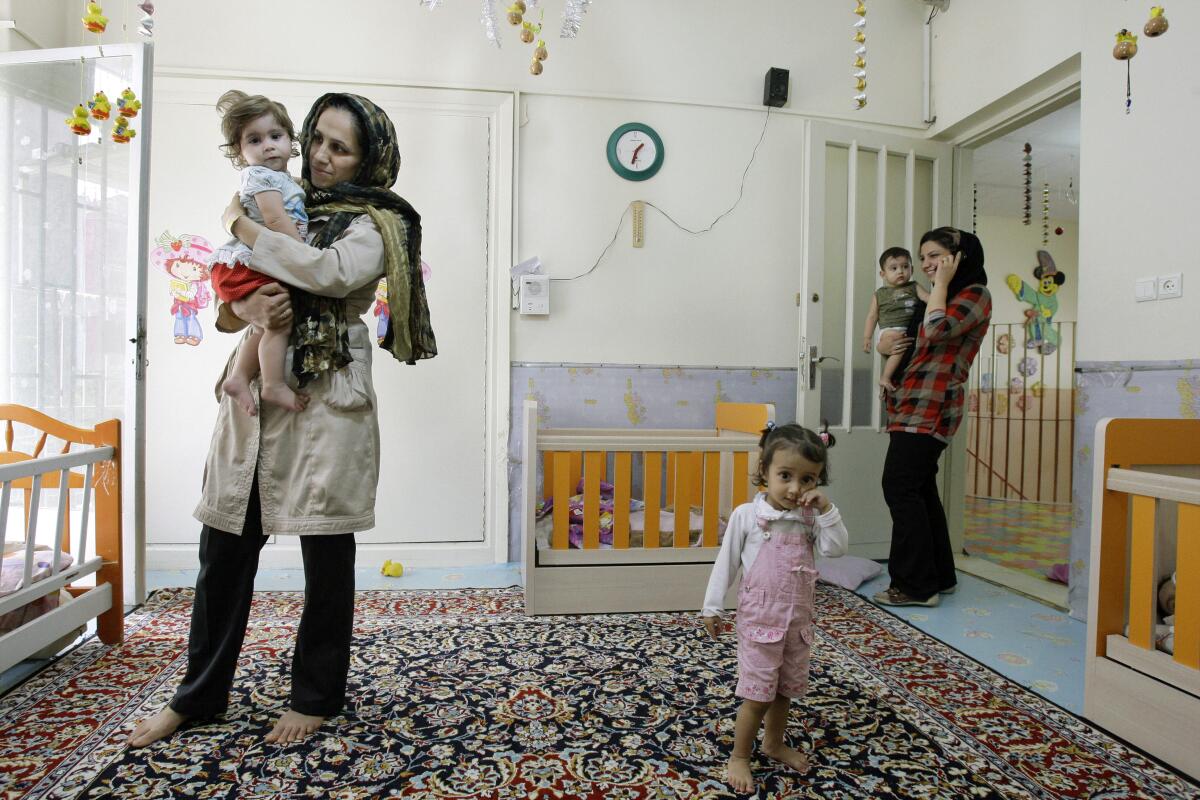
The government also wants employers, both public and private, to give new parents nine months of fully or partially paid maternity leave, which many companies complain is impossible given the collapsed economy. Even the offer of zero-interest loans to young people willing to have kids has had an unintended harmful consequence: a rise in underage girls being forced to marry men eager to take advantage of the offer, especially in the southern part of the country, a prominent Iranian newspaper reported.
Besides the government’s carrots are its sticks, whose increasing variety and use — especially against women — have grown more ominous.
The Health Ministry is piloting a website to register women in the early stages of pregnancy, to make abortion without government knowledge almost impossible. No official reliable statistics on the number of abortions performed annually in Iran are available, but an estimate by the government-affiliated Center for Demographic Studies puts it at about 400,000, while others say it is twice that.
Tehran has consistently denied carrying out operations abroad targeting dissidents, despite Western governments attributing such attacks to it.
For Venous, a 41-year-old teacher who asked that her full name not be used for privacy reasons, finding a way to end her pregnancy at six weeks almost cost her her life.
She and her husband have a 7-year-old son but decided not to add a second child. After unsuccessfully canvassing friends for abortion medication, her husband bought some under-the-counter misoprostol pills — which are also used to treat stomach ulcers — from a pharmacy in a town close to the Turkish border.
“My husband was scrupulous and kept saying what if the pills were fake and could carry risks,” Venous said. “We begged several gynecologists to monitor the procedure, but none would take the risk.”
She tearfully recounted how the pills caused so much bleeding that she was afraid she would die. No clinic would admit her for treatment. When a doctor recommended that she undergo surgery to clean the lining of her womb, she resorted to a clandestine facility.
Mohsen Chavoshi, one of Iran’s most famous singers, has helped rescue more than 50 people from the gallows in a country where justice can be harsh.
“Both I and my husband were scared to death,” she said. “Apart from the high costs of such underground operations, we were highly concerned about the safety procedures. We were turned down by many clinic owners who were subject to intense government crackdowns.”
Pregnancy screening to detect fetal abnormalities is now inaccessible to most Iranians because of its high cost — about $400 — and the decision whether to abort an unhealthy fetus is expected to be taken away from doctors and put in the hands of judicial committees.
Fatemeh Hashemi Rafsanjani, the chairwoman of a medical charity whose late father, former President Ali Akbar Hashemi Rafsanjani, launched a nationwide family-planning campaign in the 1990s, said the number of babies born with blood disorders known as thalassemia has risen since the government’s Youthful Population drive began.
There have also been reports of officials being dispatched to hospitals to check on women scheduled for surgery to remove their ovaries, to ensure that the procedures are medically necessary and not for reasons of reproductive choice.
Start your day right
Sign up for Essential California for the L.A. Times biggest news, features and recommendations in your inbox six days a week.
You may occasionally receive promotional content from the Los Angeles Times.
Amid the government’s increased meddling in people’s personal lives, some Iranian men, too, have begun telling stories of difficulty and danger in maintaining autonomy over their bodies.
Ehsan, 42, a civil servant and father of two, said he underwent a vasectomy because the cost of living for a family of four had become crippling. The process was shrouded in subterfuge.
“I had to pay extra money and bribe clinic officials to make fake documents showing I was doing a reverse vasectomy,” said Ehsan, who, like Venous, asked that his last name not be used.
He contrasted the government’s message now with the one he heard as a young adult.
For all the current hostility between Washington and Tehran, an American who journeyed to Iran more than a century ago remains an unlikely icon there.
“In college, we were bombarded by various population control courses, and it was widely advertised that, after one or two children, the best option is to go through vasectomy, which was absolutely free of charge,” he recalled.
Besides vasectomies, condoms are no longer available for free or at a nominal cost from health centers. The cheapest price on the market for a packet of six is now $2. That’s out of reach for many Iranians.
But so is the cost of actually having and raising a child, making the government’s new pro-progeny message a tough sell.
Maliheh Hosseini, a mother in the southern city of Shiraz, recently tweeted a screenshot of the expensive prices for baby shoes being demanded by an online vendor.
“Even if you want to have more children, how can you afford it?” she wrote.
Khazani is a special correspondent. Times staff writer Henry Chu in London contributed to this report.
More to Read
Sign up for Essential California
The most important California stories and recommendations in your inbox every morning.
You may occasionally receive promotional content from the Los Angeles Times.
